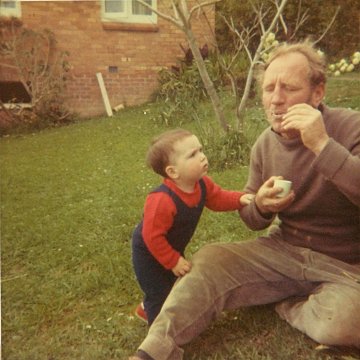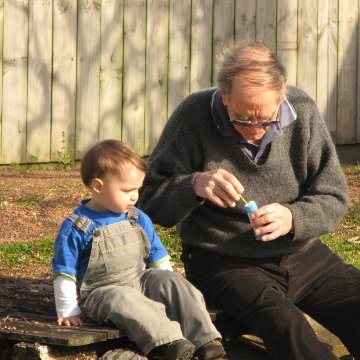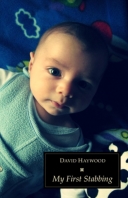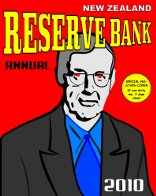In an exclusive interview with Public Address, the Speaker of the New Zealand House of Representatives talks for the first time about his close friendship with superstar Michael Jackson.
"It was 1978," remembers Dr Lockwood Smith. "And I'd just been made redundant from my job as singing coach to Sir Rex Harrison. I was completely broke. The only asset that I had was a rhyming couplet that I'd written."
The rhyme had been inspired by a trip to San Francisco in 1977. "It was pure autobiography," says Dr Smith. "The lyric ran: 'We spent the night in 'Frisco/In every type of disco.' To most people, it probably didn't seem like much, but I felt that it had the potential to become a top ten single."
Dr Smith showed the rhyming couplet to his friend Liza Minnelli. "Liza fell in love with the lyric, and suggested that it might form the basis of a song for her protégé, Michael Jackson."
The next morning, Minnelli phoned Michael's father and manager, Joe Jackson. "I read the lyric over the phone to Joe," Dr Smith recalls. "He immediately recognized its potential, and invited me to the Jackson home in Gary, Indiana."
Dr Smith struck up an immediate friendship with the Jackson brothers, but says that he formed a particular rapport with Michael. "I stayed up all of that first night rappin' and jivin' with him, and by the morning we'd written the song Blame it on the Boogie. We played it to the rest of the band, and they decided to make it their next single. It went straight to number one."
From that moment on, Dr Smith says that he was virtually adopted into the Jackson family. "Joe used to refer to me as 'the sixth member of The Jackson 5ive'. People used to think that he was joking -- but he was completely serious."
Despite his closeness to the Jackson family, Dr Smith is modest about his role in their musical success story. "Apart from Blame it on the Boogie, I don't claim to be responsible for any particular Jackson hit, but I doubt there was a single song or record in which I didn't make a vital contribution," he says. "For instance, when Michael went solo, he decided give his seventh album the title 'Mediocre'. I convinced him to change the name to Bad, which was a slang term that I'd invented a few years earlier as a synonym for the word 'good'."
Dr Smith also assisted the Jacksons with their dance moves. "It started with the head-flick in the music video for Blame it on the Boogie. By the time the Triumph album came along, I was choreographing all their live shows and television appearances."
"I think my most important dance contribution was for the Motown 25th Anniversary Special," he adds. "Michael was looking for something new, and so I introduced him to a dance that I'd been doing for years at the Orewa Surf Club: 'The Moonwalk'. Michael caught on really quickly. The darker-hued races have smaller feet, which -- I suppose -- enables them to moonwalk more rhythmically than Europeans."
Dr Smith is quick to point out that his friendship with Jackson was not simply a one-way street. "Michael often used to write questions for my popular television programme It's Academic," he says. "I remember one of them was 'Are the headlights on your father's Rolls Royce electric or acetylene?' It was a clever question. If a state school contestant attempted to answer, then either response would be marked as wrong -- because, of course, their father didn't actually own a Rolls Royce."
Jackson was also a close confidante to Dr Smith during the 1990 general election. "Michael suggested a tactic whereby I would promise to eliminate student fees, but then renege on my promise once I was voted into office," recalls Dr Smith. "We laughed about it for hours -- imagining the post-election astonishment on the faces of the students who voted for me."
But Dr Smith maintains that the best moments in the friendship were always about the music. "I can think back to when we were doing the initial mix of 'Beat It'. Michael wasn't happy with the song, and he wondered aloud what could be missing. I just looked at him and said: 'Van Halen guitar solo?'"
"Quincy [Jones] was dubious that Eddie Van Halen would agree to play on a Jackson track," continues Dr Smith. "But he'd forgotten that I was a fashion advisor to David Lee Roth. So I called up Dave, and he gave me Eddie's number, and I persuaded him to play the solo. And not only that, but I convinced him to perform without payment. A few years later, I used the same negotiation technique to score a free-trade agreement with Singapore -- an achievement that would make me arguably the greatest Minister for International Trade in New Zealand's history."
Work obligations meant that Dr Smith's friendship with Jackson became less intimate over the years, but he points out that their respective careers have had "eerie similarities".
"I know what it's like to be the victim of innuendo," says Dr Smith bitterly. "I know what it's like to have people suggest that you're living in a fantasy world. And, of course, as a former Minister of Education, I know what it's like to have people accuse you of being a menace to children."
But for Dr Smith, the laughter stopped on the 25th of June 2009. "Liza Minnelli phoned me in the middle of the night. She said: 'So sorry, Lockwood'. I knew immediately that something must have happened to Michael. We were both aware of the problems he'd been having with medication, and of course, the first words out of my mouth were: 'When the autopsy comes, all hell's going to break loose.'"
Dr Smith says that Minnelli helped him to survive the initial shock. "She has a strange, almost idiot-savant wisdom -- a bit like Muriel Newman or the title character in the film E.T.," he observes. "In the end, she healed me with just two words: 'Marry her.' At first I didn't understand what Liza meant, but then she said: 'That girl you've been dating since 1970 -- you know, old What's-her-name.'"
"It came completely from left field," maintains Dr Smith. "Obviously, we'd talked about marriage -- but because the boogie would always come first with me, it hadn't seemed fair on either party. I reminded Liza of our objections, but she just gently said: 'Michael would have wanted it, Lockwood.'"
Just over a week later, Dr Smith married his long-term girlfriend. He says that the couple have no immediate plans for children, but adds: "Of course, if one does come along, then obviously 'Blanket' is the top of our list of names."
"It been a year of great losses and gains," muses Dr Smith, "but it's a wonderful feeling to know that somewhere up there -- in Jehovah Witness heaven -- Michael is smiling down upon us."



